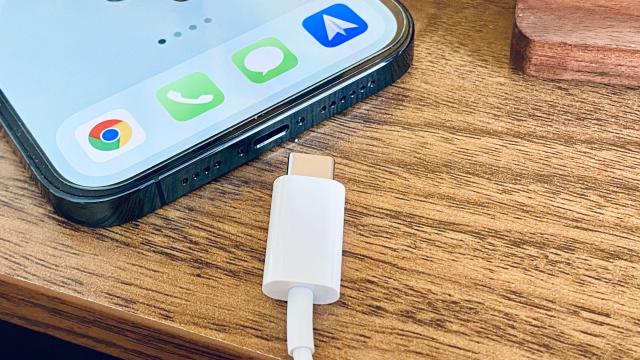The European Union refuses to give up on the dream that one day, all of us will use the same damn charger for all our devices. Today, the European Commission announced it plans to force all smartphones — and several other types of electronics — to use USB-C as the one true charging standard.
The proposed plan has four parts. The first is that “USB-C will be the common port” so that consumers can charge their devices with the same charger, “regardless of device or brand.” The European Commission says it aims to prevent different companies from capping charging speeds, and companies will also be required to provide consumers with information about charging performance, as well as whether a device supports fast charging. The idea here is to educate consumers so they know whether their existing chargers will work with a new device. Lastly, the European Commission wants chargers to be unbundled from new devices, so you can buy a new smartphone without yet another charger included in the box.
In its report, the commission notes that approximately 420 million smartphones were sold in the EU in 2020, and consumers own roughly three chargers each. The result is 11,000 tons of e-waste per year.
Under the proposal, USB-C would be the standard charging port for all smartphones, tablets, cameras, headphones, speakers, and other gadgets. Should the proposal be adopted by the European Parliament, companies would have about 24 months to make the change. Android phones have long used USB-C, but you can probably already guess which company is the major holdout.
“We remain concerned that strict regulation mandating just one type of connector stifles innovation rather than encouraging it, which in turn will harm consumers in Europe and around the world,” Apple said in a statement provided to multiple outlets.
Are we surprised? Not particularly. Apple has long opposed the EU’s efforts to establish standardised charging, citing inconvenience, innovation, and waste. That said, Apple has in recent years adopted USB-C for most of its iPads. It did so for its MacBooks as well, though recent rumours regarding the return of MagSafe this year may complicate that, even though Bloomberg’s Mark Gurman contends USB-C ports will still be included. However, for its iPhones, Apple has stuck with its proprietary Lightning cables.
But the commission isn’t buying Apple’s defence.
“European consumers were frustrated long enough about incompatible chargers piling up in their drawers,” said Margrethe Vestager, executive vice president of the European Commission. “We gave industry plenty of time to come up with their solutions, now time is ripe for legislation for a common charger.”
If this proposal passes, Apple may be forced to fully embrace USB-C for iPhones. Or, it could do an Apple and just up-end everything in the process. As the Verge notes, the commission’s proposal strictly refers to wired charging. So no, your smartwatch or other devices that rely on wireless charging won’t be impacted. (In the case of wearables, there’s a good reason why USB-C isn’t really viable.)
Rumours floated around that Apple was working on a portless iPhone 13. That didn’t come to fruition, but it’s always possible that this might spark Apple to dust off that idea again for the iPhone 14 or 15. Or, they could always do what they did when the EU pushed for micro-USB back in 2009, when they released a Lightning-to-micro-USB dongle in Europe. If there’s one thing Apple loves, it’s forcing everyone to dongle it up.
